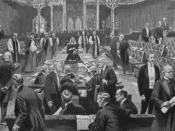Courts applying Acts of Parliament in deciding cases follow the rules of interpretation, of which there are four; the golden, literal and mischief, which has now been substituted with the purposive rule.
The golden rule, used to avoid results that would be obnoxious or contradictory in relation to the aim of the Act of Parliaments implementation, even where words have a definitive meaning, an example is set out in Re Sigsworth (1935); this case concerned a son who murdered his mother in order to inherit her estate. In accordance with the Administration of Justice Act 1925, her next of kin (her son) would become sole beneficiary in the event of her death, but judges did not see it fit for a murderer to profit from his crime and so applied the golden rule, avoiding an injustice.
The literal rule is when judges elucidate and apply statute according to the ordinary meaning of the words used therein.
Application of the mischief rule dates back to the 16th century, used to ascertain the legislator's intent, where a defendant may use legal technicalities as defence, exemplified in the case of Smith v Hughes (1960). This case demonstrates the use of semantics by defendants to clear charges brought against them, here prostitutes tried to avoid soliciting laws under the Street Offences Act 1959, by arguing that because they were not "on the street or corner of", prior to engagement of, or during the act, they had not in fact broken any laws. Judges found that they were guilty as the statutes goal was to prevent prostitutes harassing the public, so applied this rule.
The purposive rule is very similar to the mischief rule, in that it seeks to find the primary intention of an Act of Parliament when there is some obscurity...


